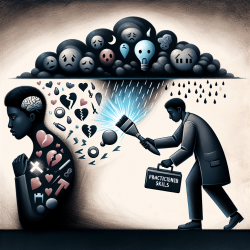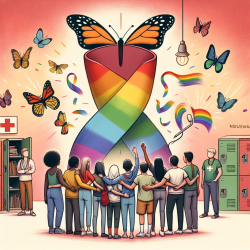Discrimination is a pervasive issue that affects various aspects of mental health, particularly among Black adolescents. Recent research titled "Discrimination Increases Suicidal Ideation in Black Adolescents Regardless of Ethnicity and Gender" provides valuable insights into this pressing issue. As practitioners working with youth, understanding these findings can enhance our ability to support and advocate for Black adolescents facing discrimination.
The Study's Key Findings
The study utilized data from the National Survey of American Life-Adolescents (NSAL-A), focusing on 1170 Black adolescents aged 13 to 17 years. The research highlighted a significant association between perceived discrimination and increased odds of suicidal ideation among these youth. This relationship held true across different ethnicities and genders, emphasizing that discrimination universally jeopardizes the mental health of Black adolescents.
- Odds Ratio (OR): The study found that higher perceived discrimination was associated with higher odds of suicidal ideation (OR = 1.09; 95% Confidence Interval (CI) = 1.02–1.17).
- No Interaction Effects: The study did not find significant interactions between perceived discrimination and ethnicity or gender on suicidal ideation.
- Universal Impact: Discrimination was associated with suicidal ideation in both African American and Caribbean Black youth, as well as across genders.
Practical Implications for Practitioners
The findings underscore the importance of addressing discrimination as a critical factor in mental health interventions for Black adolescents. Here are some practical steps practitioners can take:
- Enhance Awareness: Educate yourself about the subtle forms of discrimination that Black adolescents may face daily. This awareness can help you identify signs of distress linked to these experiences.
- Create Safe Spaces: Foster environments where adolescents feel safe discussing their experiences with discrimination. Encourage open dialogue about race and identity.
- Culturally Responsive Interventions: Implement interventions that are sensitive to the cultural backgrounds and unique challenges faced by Black youth.
- Advocate for Change: Work within your school or community to address systemic issues contributing to discrimination. Advocate for policies that promote inclusivity and equity.
- Encourage Research: Stay informed about ongoing research in this area and encourage further studies to explore protective factors and effective interventions.
The Need for Continued Research
The study highlights the universal impact of discrimination on suicidal ideation among Black youth, regardless of gender or ethnicity. However, it also points out limitations such as its cross-sectional design and reliance on self-reported measures. Future research should explore longitudinal impacts, protective factors, and intervention effectiveness across different demographic groups.
By continuing to investigate these areas, we can develop more targeted strategies to mitigate the harmful effects of discrimination on mental health outcomes in Black adolescents.
To read the original research paper, please follow this link: Discrimination Increases Suicidal Ideation in Black Adolescents Regardless of Ethnicity and Gender.










